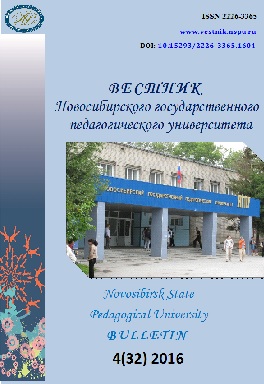Модель технологии иноязычной подготовки студентов инженерных специальностей в условиях полиязычного образования в Казахстане
The model of technology of university engineering students’ foreign language training in conditions of multilingual education in Kazakhstan
Author(s): Zhanar G. Shaikhyzada, Ekaterina Alekseevna Kostina, Anatoly M. Zatyneyko, Aissulu Erkinovna Kubeyeva, Bakhytgul Asylbekovna ZhetpisbayevaSubject(s): Education, Vocational Education, Higher Education
Published by: Новосибирский государственный педагогический университет
Keywords: Technology; higher engineering education; Euroengineer; foreign language education; foreign language training; foreign language communicative competency; pedagogical technology; model
Summary/Abstract: Nowadays foreign language education is considered to be an essential component of higher vocational education since during the introduction of Kazakhstan’s higher educational establishments in the Bologna process, which implies the academic and professional recognition of the country’s diplomas in European countries, a high level of foreign language proficiency is necessary for experts of any profile. In particular, this statement is of great importance in the field of training engineering specialists in Kazakhstan connected with the necessity of international accreditation of educational programs in the field of engineering and technologies and the possibility for engineering professionals to receive the rank of "Euro engineer". The demand to train engineers in compliance with the European standards of engineering education foregrounds for Kazakhstan’s universities issues concerning purposeful and continuous foreign languages teaching which has to be aimed at the formation of students’ foreign language communicative competency. The solution of these issues calls for a new conceptual approach to engineering students’ foreign language training within higher vocational education which would provide with the most optimal way of achieving the stated goal. In this regard, the article authors address to the question of using pedagogical technologies in the process of foreign languages teaching and learning which enable to set up precise goals, plan the expected outcome and focus the whole activity on its achievement. In the article the authors introduce the new concept "technology of university engineering students’ foreign language training" and provide insight into it. They also present the model of this technology which includes such interrelated components as the goal and outcomes of foreign languages teaching, content-related, organizational-procedural and monitoring-assessment components. The presented model suggests the modernization of the process of foreign language teaching, the selection of the language learning content and the putting of the national assessment system in conformity with the European Credit Transfer and Accumulation System (ECTS). Thus, through the relative determination and organization of each structural component of its model, the technology of university engineering students’ foreign language training condition facilitates the achievement of the main goal of teaching foreign languages in higher schools – the formation of students’ foreign language communicative competency.
Journal: Вестник Новосибирского государственного педагогического университета
- Issue Year: 6/2016
- Issue No: 4
- Page Range: 92-107
- Page Count: 16
- Language: English

